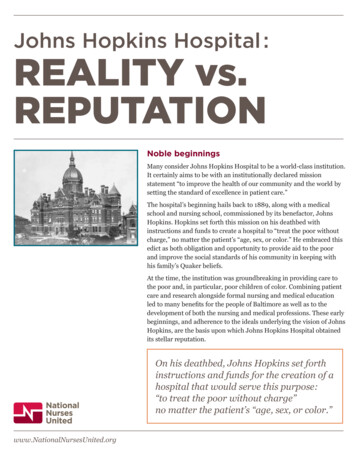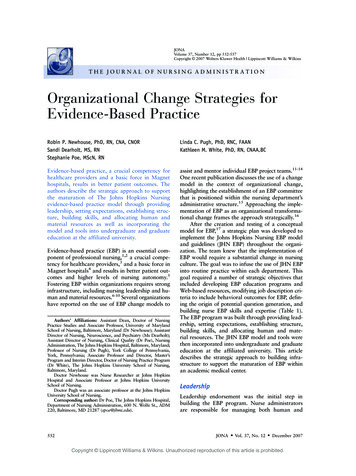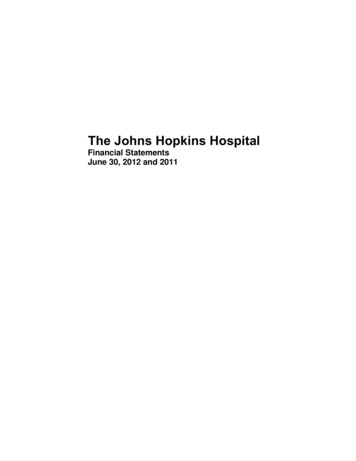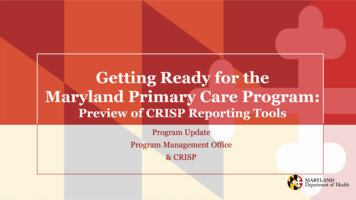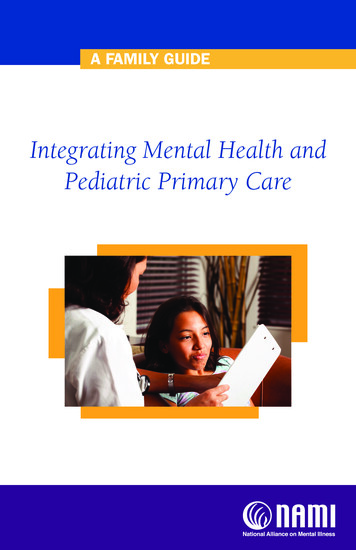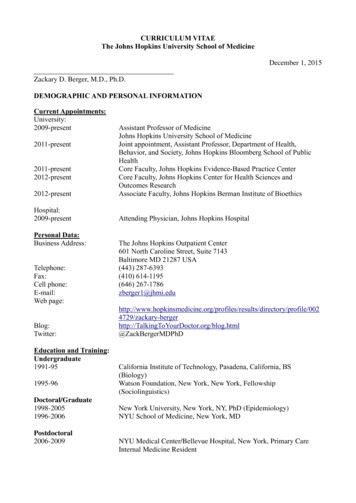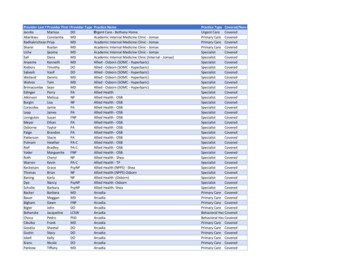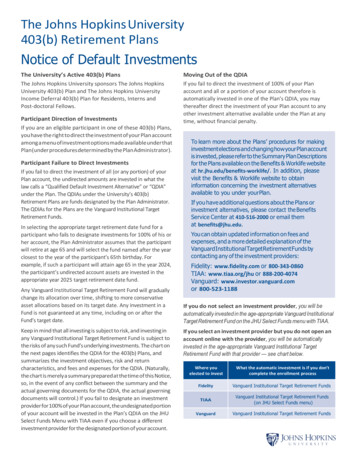
Transcription
MARYLAND PRIMARY CARE PROGRAMCARE TRANSFORMATION ARRANGEMENTThis Care Transformation Arrangement (“Arrangement”) is between , a care transformationorganization (the “CTO”), and , (the “Practice”) (each a “Party,” and collectively the “Parties”).The CTO has been selected by the Centers for Medicare and Medicaid Services (“CMS”), Center for Medicare andMedicaid Innovation (“CMMI”), to serve as a care transformation organization in the Maryland Primary Care Program(“MDPCP”). The Practice is a primary care practice that provides health care services to Medicare beneficiaries, among others,in the State of Maryland.This Arrangement sets forth the terms and conditions under which the CTO will provide to the Practice certain caretransformation services and resources consistent with MDPCP requirements.1.Participation Agreements. Prior to the Effective Date of this Arrangement, the CTO must sign an MDPCP ParticipationAgreement with CMMI (the “CTO Participation Agreement”). Prior to the Effective Date of this Arrangement, the Practicemust sign an MDPCP Participation Agreement with CMMI (the “Practice Participation Agreement”). If either Party doesnot sign a Participation Agreement with CMMI prior to the Effective Date of this Arrangement, then this Arrangementshall be deemed null ab initio.2.Effective Date. The Effective Date of this Arrangement is January 1, 2021.A Party’s performance obligations under thisArrangement shall not begin prior to the Effective Date.3.Term of Arrangement. This Arrangement is effective for a minimum of one full Performance Year, which consists of a12-month period beginning on January 1 of each year, and will renew automatically on January 1 of each year, untilterminated by either party in accordance with Section 12 of this Arrangement, or upon the execution of a new CTOArrangement. This Arrangement is subject to early termination by either Party only if: (1) CMS terminates either the CTOParticipation Agreement or the Practice Participation Agreement, or (2) if CMS authorizes, in writing, such earlytermination of this Arrangement.4.Offer and Selection of CTO Services. The Practice is responsible for meeting the Care Transformation Requirements aslisted in Appendix A. The CTO will support the Practice in meeting those requirements including any support specified inthe either the CTO or Practice Participation Agreements. The CTO has offered to provide any and all of the CTO Servicesto the Practice, as listed in the package selected in Appendix B. The CTO offers these same CTO Services to allparticipating practices within the same service option level and Track.5.Care Management Fees. CMS will calculate the Practice’s Care Management Fees (“CMF”) according to the CTOParticipation Agreement, the Practice Participation Agreement, and the methodologies described therein. In accordancewith the Practice’s selection that was submitted to CMS, the CMF payment split will be as follows: CTO will receive 30% of the practice’s CMF payment amount calculated by CMS, and the remaining70% of such CMF payment amount will be paid to the Practice. CTO will receive 50% of the practice’s CMF payment amount calculated by CMS and theremaining 50% of such CMF payment amount will be paid to the Practice.6.Lead Care Manager. For practices choosing the 50% option, the CTO will provide the Practice with one or moreindividuals who are fully dedicated to care management functions of the Practice (the “Lead Care Manager”), andadditional services selected in accordance with Section 4. For practices choosing the 30% option, the practice will haveits own care manager(s) to work in conjunction with the CTO and the CTO’s offerings in accordance with Section 4.Practice will identify care manager responsible for working with the CTO.7.Data Sharing and Privacy. The Practice authorizes the CTO to have access to all clinical data available in the electronicmedical records or shared through the State-Designated Health Information Exchange (“HIE”), including personal healthinformation, of MDPCP Beneficiaries attributed to the Practice. The Practice authorizes the CTO to have access via CRISPto quality and utilization reports available to the Practice. The CTO will include a Business Associate Agreement (“BAA”)for the Practice to approve. The BAA will govern their data sharing, use, and confidentiality, a copy of which is inAppendix C. Each Party will comply with HIE policies and regulations, including patient education requirements, andwill execute any separate agreement that may be required by CRISP.1
MARYLAND PRIMARY CARE PROGRAMCARE TRANSFORMATION ARRANGEMENT8.Notification of Changes in Medicare Enrollment. The Practice will notify the CTO of any changes to the Practice’sMedicare beneficiary enrollment information within thirty (30) days after such changes occur.9.No Remuneration Provided. Neither the CTO nor the Practice has offered, given, or received remuneration in return for,or to induce business other than the business covered under this CTO Arrangement.10. Practice of Medicine or Professional Services Not Limited by this Arrangement. The Arrangement does not limit or restrictin any way the ability of the Practice and its clinician(s) to make medical decisions that they consider in their professionaljudgment to be in the best interest of a MDPCP Beneficiary.11. Compliance with All Applicable Laws. This Arrangement does not alter or amend the Parties’ being bound to comply withall relevant federal and State laws, including, but not limited to, health care fraud and abuse laws, HIPAA, and the MarylandMedical Practice Act. The CTO will continue to be bound by the terms of the CTO Participation Agreement, and thePractice will continue to be bound by the terms of the Practice Participation Agreement.12. Termination. Either Party may terminate this Arrangement annually or earlier by providing written notice of terminationto the other Party, CMS and the Program Management Office. If the Practice or CTO decides to terminate this Arrangementfor any reason, it must provide written notice in accordance with the notification and termination requirements stated inthe applicable MDPCP Participation Agreements. This Arrangement automatically terminates on the Effective Date ofthe termination of either the CTO Participation Agreement or the Practice Participation Agreement.13. Copies and Retention of Arrangement. The Practice will provide a copy of this Arrangement to the CTO and the MarylandDepartment of Health, Program Management Office, within thirty (30) days of execution. The CTO will retain copies ofthis Arrangement for a period of ten (10) years following expiration or termination of the CTO Participation Agreement.The CTO will, upon request, provide copies of this Arrangement to the federal government, including, but not limited to,CMS, the HHS Office of the Inspector General, or the Comptroller General.14. Amendments. The Parties may amend this Arrangement including, but not limited to, the CTO Services offered andprovided, at any time upon mutual written consent. The CTO must continue to offer the same CTO Services to allparticipating practices within the same service option level and Track, as specified in Section 4 of this Arrangement.IN WITNESS THEREOF, and in acknowledgement of the aforementioned, the authorized representatives of the CTOand the Practice do hereby indicate their approval and consent:FOR THE CARE TRANSFORMATION ORGANIZATION:FOR THE PRACTICE:SignatureSignaturePrinted NamePrinted NameMDPCP CTO IDMDPCP Practice IDTitleTitleDate SignedDate Signed2
MARYLAND PRIMARY CARE PROGRAMCARE TRANSFORMATION ARRANGEMENTAppendix A:Care Transformation RequirementsComprehensive PrimaryCare Functions ofAdvanced Primary CareCare Transformation Requirement1.1 Empanel attributed beneficiaries to practitioner or care team.Access and ContinuityCare ManagementComprehensiveness andCoordination across theContinuum of CareBeneficiary & CaregiverExperiencePlanned Care for HealthOutcomes1.2 Ensure attributed beneficiaries have 24/7 access to a care team orpractitioner with real-time access to the EHR.1.3 Ensure attributed beneficiaries have regular access to the careteam or practitioner through at least one alternative care strategy.2.1 Ensure all empaneled, attributed beneficiaries are risk stratified.2.2 Ensure all attributed beneficiaries identified as increased risk andlikely to benefit receive targeted, proactive, relationship-based(longitudinal) care management.2.3 Ensure attributed beneficiaries receive a follow-up interactionfrom your practice within one week for ED discharges and twobusiness days for hospital discharges.2.4 Ensure targeted, attributed beneficiaries who have receivedfollow-up after ED, hospital discharge, or other triggering eventsreceive short-term (episodic) care management.2.5 Ensure attributed beneficiaries in longitudinal care managementare engaged in a personalized care planning process, which includesat least their goals, needs, and self-management activities.2.6 Ensure attributed beneficiaries in longitudinal care managementhave access to comprehensive medication management.3.1 Ensure coordinated referral management for attributedbeneficiaries seeking care from high-volume and/or high-costspecialists as well as EDs and hospitals.3.2 Ensure attributed beneficiaries with behavioral health needs haveaccess to care consistent with at least one option from a menu ofoptions for integrated behavioral health supplied to attributedbeneficiaries by the Practice3.3 Facilitate access to resources that are available in yourcommunity for beneficiaries with identified health-related socialneeds4.1 Convene a Patient-Family/ Caregiver Advisory Council (PFAC)at least annually and integrate PFAC recommendations into care andquality improvement activities.4.2 Engage attributed beneficiaries and caregivers in a collaborativeprocess for advance care planning5.1 Continuously improve your performance on key outcomes,including cost of care, electronic clinical quality measures,beneficiary experience, and utilization measures.3PracticeTrack RequirementTrack 1 2Track 1 2Track 2 onlyTrack 1 2Track 1 2Track 1 2Track 1 2Track 2 onlyTrack 2 onlyTrack 1 2Track 1 2Track 2 onlyTrack 1 2Track 2 onlyTrack 1 2
MARYLAND PRIMARY CARE PROGRAMCARE TRANSFORMATION ARRANGEMENTAppendix B:CTO Services/Personnel Offered and Practice SelectionPackage A (50%)Service CategoryCare Requirement &Quality MeasureDescriptionStaff TypeRatio of staff (FTE)to practiceBehavioral HealthIntegration (BHI)Comprehensiveness& Coordination 3.2Access to behavioral health teamconsisting of a licensed mental healthprofessional, LCSW-C or LCPC,(Health Behavioral Specialist) andpsychiatrist who work together tosupport primary care staff caring forpatients with behavioral health needs.HBS staff will be embedded (on thepremises) at some sites and will supportother regional sites primarilytelephonically. HBS will provide on-siteservices to assigned regional sites. TheJMAP psychiatrist is available forconsultation to discuss psychotropicmanagement, recommend treatmentapproaches and referrals.Access to pharmacy services as part of amulti-disciplinary care team eitherembedded in partner practice sites orwho service the geographic region.Services include: Chronic disease state management Medication therapy adjustments Polypharmacy assessment Medication adherence support andinterventions In-depth medication reconciliation Patient education Drug information and medicationconsultsProvides assistance with workflows andcapabilities to implement screeningtools for health-related social needs andconnections to community resources.Behavioral HealthMedical DirectorAll practicesPsychiatristOn average 0.3 per8 practicesHBS SupervisorAll practicesHealth BehaviorSpecialist (LCSWC or LCPC)On average 1 per 4practicesPharmacistsOn average 1 per10 practicesLead Care Manager(RN or LCSW-C)On average 1 per 2practices (1 per2,000 patients)QualityImprovement &PracticeTransformationCoachOn average, 1 per10 practicesMedicationManagementCare Management2.6Social DeterminantsScreening & ReferralComprehensiveness& Coordination 3.34
MARYLAND PRIMARY CARE PROGRAMCARE TRANSFORMATION ARRANGEMENTAlternative Care(e.g., Telehealth,home visits)Transitional CareManagement (TCM)Access & Continuity1.3Care Management2.2, 2.3, 2.4, 2.5, 2.6All care coordination team members areequipped to provide telehealth servicesthrough appropriate access to resourcesand training.Provides support with identifyingpatients being discharged from hospitaland with establishing a process fortransitional care follow-up, including: Notification of patient admission tooutpatient care team member Medication reconciliation Communication between caresettings and providers Timely contact with patients afterhospitalization to schedule followup visits with primary care Connect patients to communitybased resources as needed Guidance and assistance withworkflows, best practices, andperformance improvement5Lead Care Manager(RN or LCSW-C)On average 1 per 2practices (1 per2,000 patients)PsychiatristOn average 0.3 per8 practicesHealth BehaviorSpecialist (LCSWC or LCPC)On average 1 per 4practicesPharmacistOn average 1 per10 practicesOn average 1 per 2practices (1 per2,000 patients)Lead Care Manager(RN or LCSW-C)QualityImprovement &PracticeTransformationCoachOn average 1 per10 practices
MARYLAND PRIMARY CARE PROGRAMCARE TRANSFORMATION ARRANGEMENTCare Planning &Self-ManagementSupportCare Management2.5, Beneficiary &Caregiver Experience4.2Lead care managers are based at theprimary care site(s) to promote inperson communication andcollaboration with primary care team.Additional offerings include:Care CoordinationMedical DirectorAll practicesDirector of CareCoordinationAll practices-Care CoordinationManagersAll practicesLead Care Manager(RN or LCSW-C)On average 1 per 2practices (1 per2,000 patients)PsychiatristOn average 0.3 per8 practicesHealth BehaviorSpecialist (LCSWC or LCPC)On average 1 per 4practicesPharmacistOn average 1 per10 practicesQualityImprovement &PracticeTransformationCoachOn average, 1 per10 practicesProvides access to reports andinformation to assist practices withidentifying areas of opportunities tomake improvements.Data AnalystOn average, 1 per10 practicesQualityImprovement &PracticeTransformationCoachOn average, 1 per10 practices-QualityImprovement &PracticeTransformationCoachOn average, 1 per10 practicesData AnalystOn average, 1 per10 practices----Population HealthManagement &AnalyticsClinical & ClaimsData AnalysisPlanned Care forHealth Outcomes 5.1,eCQMs, UtilizationCare Management2.1-2.4, Utilization--Providing comprehensive medical,cognitive, and social needsassessment and creates anindividualized care plan for themost vulnerable patients.Provide episodic care for patientswith transient needs.Act as a “communications hub” forproviders and other team membersabout patient care.Providing transitional care at timesof high need (e.g. duringhospitalization) by proactivelyconnecting and coordinating withinpatient care teams.In addition to face-to-faceinteractions, provide directtelephonic access to patients.Leverage EMR clinical data,claims, CRISP, and primary carereferrals to identify high-riskpatients.Support for implementation ofpredictive analytics (JohnsHopkins ACG System, Hilltopreports, Milliman Predictive ModelTool), as feasible, dependent uponaccess to claims data, to assist inthe optimal deployment of carecoordination resources and to guidepractices to focus on high-cost,high need patientsGuidance, assistance, and supportfor utilizing CRISP reporting toobtain real-time alerts from ENSon admissions, emergencydepartment visits, and transfers toskilled nursing facilitiesTechnical assistance / consultingservices to assess gaps and developan implementation plan to meetprogram requirements6
MARYLAND PRIMARY CARE PROGRAMCARE TRANSFORMATION ARRANGEMENTPatient FamilyAdvisory Councils(PFACs)Beneficiary &Caregiver Experience4.1Provides guidance, assistance, and bestpractices with PFAC implementationand ongoing improvement.Quality & UtilizationPerformancePlanned Care forHealth Outcomes 5.1,eCQMsProvides guidance on programrequirements, facilitates practicetransformation through the developmentof processes to establish and maintainquality improvement projects gearedtowards optimizing performance.Practice transformation is accomplishedusing data analytics, reviewing primarycare office workflows, andincorporating best practices to improvecare. Provides practices with the dataand tools to deliver high-quality,patient-centered care, and advocates forinnovation and continuous performanceimprovement using Lean Six Sigmatools and methodologies. Providesguidance for use of quality andutilization measures, and other metricsto demonstrate primary care functionrequirements (e.g. advance careplanning, self-management) throughBest practice guides and specific tooldevelopment.Provides technical assistance with EMRassessment (e.g. access to a patientportal) and consulting services to assessgaps and develop an implementationplan to meet program requirements.24/7 AccessReferral ManagementAccess & Continuity1.2Comprehensiveness& Coordination 3.1Provides technical assistance withworkflows, reporting capabilities, andpotential EMR solutions to trackreferrals and identify high valuespecialists, using Milliman MedicalEpisode Grouping (MEG) Functionalityto identify high cost specialists.7QualityImprovement &PracticeTransformationCoachQualityImprovement &PracticeTransformationCoachOn average, 1 per10 practicesData AnalystOn average, 1 per10 practicesQualityImprovement &PracticeTransformationCoachOn average, 1 per10 practicesData AnalystOn average, 1 per10 practicesQualityImprovement &PracticeTransformationCoachOn average, 1 per10 practicesData AnalystOn average, 1 per10 practicesOn average, 1 per10 practices
MARYLAND PRIMARY CARE PROGRAMCARE TRANSFORMATION ARRANGEMENTPackage B (30%)**Practice will provide its own Lead care manager to work in conjunction with the CTO and the CTO’s offerings.Partner practices have the option of requesting or purchasing access to additional care coordination resources.Service CategoryCare Requirement& Quality MeasureDescriptionStaff TypeRatio of staff (FTE)to practiceBehavioral HealthIntegration (BHI)Comprehensiveness& Coordination 3.2Access to behavioral health teamconsisting of a licensed mental healthprofessional, LCSW-C or LCPC, (HealthBehavioral Specialist) and psychiatristwho work together to support primary carestaff caring for patients with behavioralhealth needs. HBS staff will be embedded(on the premises) at some sites and willsupport other regional sites primarilytelephonically. HBS will provide on-siteservices to assigned regional sites. TheJMAP psychiatrist is available forconsultation to discuss psychotropicmanagement, recommend treatmentapproaches and referrals.Access to pharmacy services as part of amulti-disciplinary care team eitherembedded in partner practice sites or whoservice the geographic region. Servicesinclude: Chronic disease state management Medication therapy adjustments Polypharmacy assessment Medication adherence support andinterventions In-depth medication reconciliation Patient education Drug information and medicationconsultsProvides assistance with workflows andcapabilities to implement screening toolsfor health-related social needs andconnections to community resources.Behavioral HealthMedical DirectorAll practicesPsychiatristOn average 0.2 per8 practicesHBS SupervisorAll practicesHealth BehaviorSpecialist (LCSWC or LCPC)On average 0.8 per4 practicesPharmacistsOn average 0.8 per10 practicesQualityImprovement &PracticeTransformationCoachOn average, 1 per10 practicesAll care coordination team members areequipped to provide telehealth servicesthrough appropriate access to resourcesand training.PsychiatristOn average 0.2 per8 practicesHealth BehaviorSpecialist (LCSWC or LCPC)On average 0.8 per4 practicesPharmacistOn average 0.8 per10 practicesOn average, 1 per10 practicesMedicationManagementCare Management2.6Social DeterminantsScreening &ReferralComprehensiveness& Coordination 3.3Alternative Care(e.g., Telehealth,home visits)Access &Continuity 1.3Transitional CareManagement(TCM)Care Management2.2, 2.3, 2.4, 2.5, 2.6Provides support with identifying patientsbeing discharged from hospital andsupport with establishing a process fortransitional care follow-up. including: Guidance and assistance withworkflows, best practices, andperformance improvement8QualityImprovement &PracticeTransformationCoach
MARYLAND PRIMARY CARE PROGRAMCARE TRANSFORMATION ARRANGEMENTCare Planning &Self-ManagementSupportPopulation HealthManagement &AnalyticsClinical & ClaimsData AnalysisPatient FamilyAdvisory Councils(PFACs)Care Management2.5, Beneficiary &CaregiverExperience 4.2Practice will provide Lead CM. Partnerpractices have the option of requesting orpurchasing access to additional carecoordination resources. Pharmacy andbehavioral health services will continue tosupport high risk patients as requested.Care CoordinationMedical DirectorAll practicesBehavioral HealthMedical DirectorAll practicesPsychiatristOn average 0.2 per8 practicesHBS SupervisorAll practicesHealth BehaviorSpecialist (LCSWC or LCPC)On average 0.8 per4 practicesPharmacistOn average 0.8 per10 practicesQualityImprovement &PracticeTransformationCoachOn average, 1 per10 practicesPlanned Care forHealth Outcomes5.1, eCQMs,UtilizationProvides access to reports and informationto assist practices with identifying areas ofopportunities to make improvements,using Milliman tools for benchmarkingand claims data analytics and CRISPreporting suite.Data AnalystOn average, 1 per10 practicesQualityImprovement &PracticeTransformationCoachOn average, 1 per10 practicesCare Management2.1-2.4, Utilization-QualityImprovement &PracticeTransformationCoachOn average, 1 per10 practicesData AnalystOn average, 1 per10 practicesQualityImprovement &PracticeTransformationCoachOn average, 1 per10 practicesBeneficiary &CaregiverExperience 4.1Support for implementation ofpredictive analytics (Johns HopkinsACG System, Hilltop reports,Milliman Predictive Model Tool), asfeasible, dependent upon access toclaims data, to assist in the optimaldeployment of care coordinationresources and to guide practices tofocus on high-cost, high needpatients,Guidance, assistance, and support forutilizing CRISP reporting to obtainreal-time alerts from ENS onadmissions, emergency departmentvisits, and transfers to skilled nursingfacilitiesTechnical assistance / consultingservices to assess gaps and developan implementation plan to meetprogram requirementsProvides guidance, assistance, and bestpractices with PFAC implementation andongoing improvement.9
MARYLAND PRIMARY CARE PROGRAMCARE TRANSFORMATION ARRANGEMENTQuality &UtilizationPerformance24/7 AccessReferralManagementPlanned Care forHealth Outcomes5.1, eCQMsAccess &Continuity 1.2Comprehensiveness& Coordination 3.1Provides guidance on programrequirements, facilitates practicetransformation through the development ofprocesses to establish and maintain qualityimprovement projects geared towardsoptimizing performance. Practicetransformation is accomplished using dataanalytics, reviewing primary care officeworkflows, and incorporating bestpractices to improve care. Providespractices with the data and tools to deliverhigh-quality, patient-centered care, andadvocates for innovation and continuousperformance improvement using Lean SixSigma tools and methodologies. Providesguidance for use of quality and utilizationmeasures, and other metrics todemonstrate primary care functionrequirements (e.g. advance care planning,self-management) through Best practiceguides and specific tool development.Provides technical assistance with EMRassessment (e.g. access to a patient portal)and consulting services to assess gaps anddevelop an implementation plan to meetprogram requirements.Provides technical assistance withworkflows, reporting capabilities, andpotential EMR solutions to track referralsand identify high value specialists10QualityImprovement &PracticeTransformationCoachOn average, 1 per10 practicesData AnalystOn average, 1 per10 practicesQualityImprovement &PracticeTransformationCoachOn average, 1 per10 practicesData AnalystOn average, 1 per10 practicesQualityImprovement &PracticeTransformationCoachOn average, 1 per10 practicesData AnalystOn average, 1 per10 practices
MARYLAND PRIMARY CARE PROGRAMCARE TRANSFORMATION ARRANGEMENTFinal Practice Selection Package A (50%) Package B (30%)Practice Signature CTO Signature11
MARYLAND PRIMARY CARE PROGRAMCARE TRANSFORMATION ARRANGEMENTAppendix C:Business Associate Agreementbetween the CTO and the Practice[Attached hereto]12
Medicaid Innovation ("CMMI"), to serve as a care transformation organization in the Maryland Primary Care Program ("MDPCP"). The Practice is a pri mary care practice that provides health care services to Medicare beneficiaries, among others, . The CTO will include a Business Associate Agreement ("BAA") for the Practice to approve .

